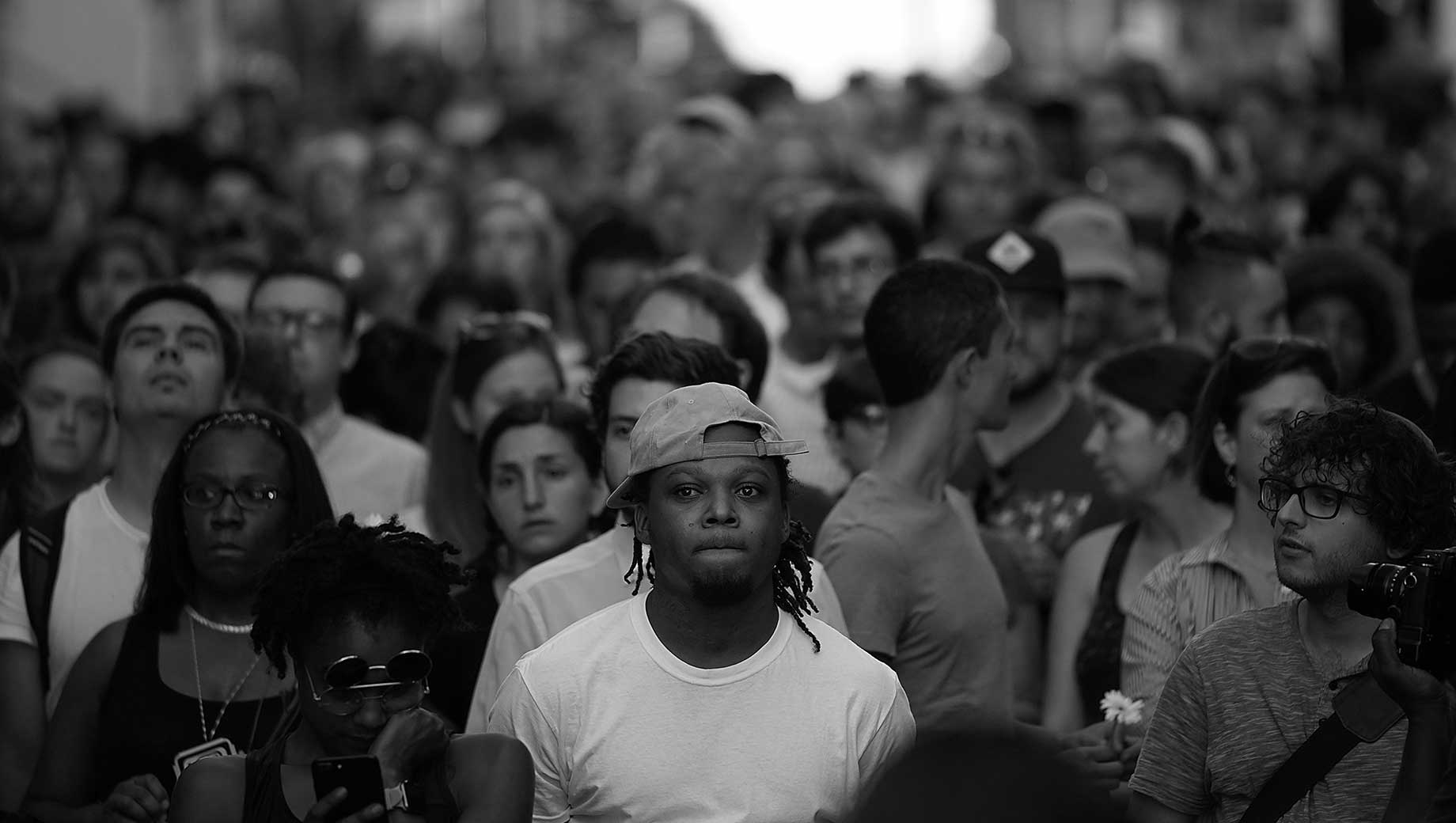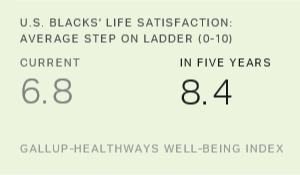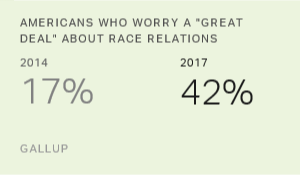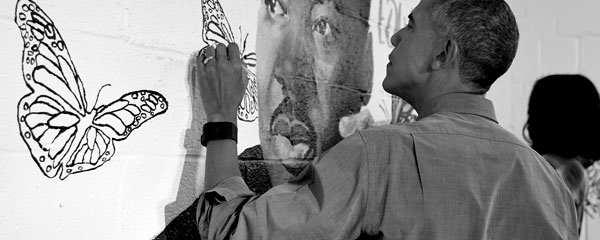Story Highlights
- Fewer satisfied with the treatment of blacks, Hispanics, immigrants, Asians
- Democrats, blacks are significantly less satisfied compared with 2016 survey
- More now say blacks are treated less fairly than whites in a variety of situations
WASHINGTON, D.C. -- Americans' satisfaction with the way several minority groups are treated in society has fallen in recent years. Significantly fewer Americans now than in 2016 are satisfied with the way immigrants, blacks, Hispanics and Asians are treated. As a result, figures for the treatment of blacks and Hispanics now join those for immigrants and Arabs below the majority level.
| 2016 | 2018 | Change | |||||||||||||||||||||||||||||||||||||||||||||||||||||||||||||||||||||||||||||||||||||||||||||||||
|---|---|---|---|---|---|---|---|---|---|---|---|---|---|---|---|---|---|---|---|---|---|---|---|---|---|---|---|---|---|---|---|---|---|---|---|---|---|---|---|---|---|---|---|---|---|---|---|---|---|---|---|---|---|---|---|---|---|---|---|---|---|---|---|---|---|---|---|---|---|---|---|---|---|---|---|---|---|---|---|---|---|---|---|---|---|---|---|---|---|---|---|---|---|---|---|---|---|---|---|
| % Satisfied | % Satisfied | Pct. pts. | |||||||||||||||||||||||||||||||||||||||||||||||||||||||||||||||||||||||||||||||||||||||||||||||||
| Asians | 75 | 66 | -9 | ||||||||||||||||||||||||||||||||||||||||||||||||||||||||||||||||||||||||||||||||||||||||||||||||
| Hispanics | 54 | 46 | -8 | ||||||||||||||||||||||||||||||||||||||||||||||||||||||||||||||||||||||||||||||||||||||||||||||||
| Blacks | 51 | 44 | -7 | ||||||||||||||||||||||||||||||||||||||||||||||||||||||||||||||||||||||||||||||||||||||||||||||||
| Arabs | 45 | 44 | -1 | ||||||||||||||||||||||||||||||||||||||||||||||||||||||||||||||||||||||||||||||||||||||||||||||||
| Immigrants | 43 | 37 | -6 | ||||||||||||||||||||||||||||||||||||||||||||||||||||||||||||||||||||||||||||||||||||||||||||||||
| Note: Percentages include those very/somewhat satisfied. | |||||||||||||||||||||||||||||||||||||||||||||||||||||||||||||||||||||||||||||||||||||||||||||||||||
| Gallup | |||||||||||||||||||||||||||||||||||||||||||||||||||||||||||||||||||||||||||||||||||||||||||||||||||
These results are based on Gallup's Race Relations poll of more than 6,000 U.S. adults, including more than 700 blacks and Hispanics, conducted Nov. 19-Dec. 22, 2018.
Among blacks, just 18% are satisfied with the way society treats blacks, down from 32% in 2016 and a high of 47% in 2013. Whites and Hispanics are also less satisfied with the treatment of blacks than they were three years ago.

Hispanics' satisfaction with the way Hispanics are treated has also fallen, from 46% to 37%. Blacks' satisfaction with Hispanics' treatment has fallen even further, dropping from 43% to 25%, while there has been only a small decline among whites.
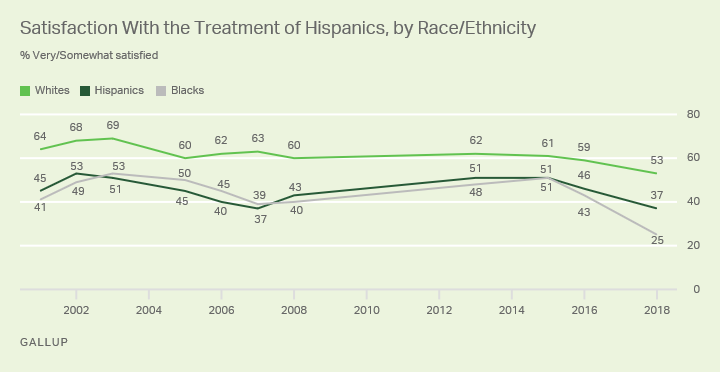
Blacks' satisfaction with the way immigrants and Arabs are treated also has dropped more than whites' and Hispanics' satisfaction has.
优蜜传媒 seems to be a big reason behind the changes in opinion -- especially among Democrats, who may be expressing their frustration with the Trump administration's policies toward immigrants and minority groups. Democrats show double-digit declines in satisfaction with the treatment of all groups, except Arabs (for whom ratings were already low).
Meanwhile, there has been little to no change in independents' views. Republicans' satisfaction also has changed little, for the most part, with two notable exceptions -- significant increases in their satisfaction with the way immigrants and Arabs are treated.
| Democrats | Independents | Republicans | |||||||||||||||||||||||||||||||||||||||||||||||||||||||||||||||||||||||||||||||||||||||||||||||||
|---|---|---|---|---|---|---|---|---|---|---|---|---|---|---|---|---|---|---|---|---|---|---|---|---|---|---|---|---|---|---|---|---|---|---|---|---|---|---|---|---|---|---|---|---|---|---|---|---|---|---|---|---|---|---|---|---|---|---|---|---|---|---|---|---|---|---|---|---|---|---|---|---|---|---|---|---|---|---|---|---|---|---|---|---|---|---|---|---|---|---|---|---|---|---|---|---|---|---|---|
| %, 2016 | %, 2018 | %, 2016 | %, 2018 | %, 2016 | %, 2018 | ||||||||||||||||||||||||||||||||||||||||||||||||||||||||||||||||||||||||||||||||||||||||||||||
| Asians | 68 | 52 | 71 | 67 | 89 | 87 | |||||||||||||||||||||||||||||||||||||||||||||||||||||||||||||||||||||||||||||||||||||||||||||
| Hispanics | 41 | 23 | 51 | 48 | 75 | 79 | |||||||||||||||||||||||||||||||||||||||||||||||||||||||||||||||||||||||||||||||||||||||||||||
| Blacks | 32 | 20 | 50 | 45 | 76 | 77 | |||||||||||||||||||||||||||||||||||||||||||||||||||||||||||||||||||||||||||||||||||||||||||||
| Arabs | 28 | 23 | 43 | 44 | 65 | 74 | |||||||||||||||||||||||||||||||||||||||||||||||||||||||||||||||||||||||||||||||||||||||||||||
| Immigrants | 33 | 16 | 41 | 38 | 58 | 68 | |||||||||||||||||||||||||||||||||||||||||||||||||||||||||||||||||||||||||||||||||||||||||||||
| Note: Percentages include those very/somewhat satisfied. | |||||||||||||||||||||||||||||||||||||||||||||||||||||||||||||||||||||||||||||||||||||||||||||||||||
| Gallup | |||||||||||||||||||||||||||||||||||||||||||||||||||||||||||||||||||||||||||||||||||||||||||||||||||
Democrats now show low levels of satisfaction, between 16% and 23%, for the way most groups are treated. A slim majority of Democrats remain satisfied with the treatment of Asians.
Less than a majority of independents are satisfied with the way all groups are treated, except Asians, while solid majorities of Republicans express satisfaction with the treatment of all five groups asked about.
Record-High Percentages Say Blacks Treated Less Fairly in Many Situations
In addition to measuring Americans' satisfaction with the way society treats various groups, 优蜜传媒also asked whether they think blacks are treated less fairly than whites in a variety of situations. About one in four U.S. adults (24%) say blacks are treated less fairly than whites in getting healthcare from doctors and hospitals, while more than half (52%) say the same about interactions with police.
Since 2016, perceptions that blacks are treated less fairly have increased for each of the six situations tested. All are at high points in their trends, which stretch back to 1997.
| 2016 | 2018 | Change | |||||||||||||||||||||||||||||||||||||||||||||||||||||||||||||||||||||||||||||||||||||||||||||||||
|---|---|---|---|---|---|---|---|---|---|---|---|---|---|---|---|---|---|---|---|---|---|---|---|---|---|---|---|---|---|---|---|---|---|---|---|---|---|---|---|---|---|---|---|---|---|---|---|---|---|---|---|---|---|---|---|---|---|---|---|---|---|---|---|---|---|---|---|---|---|---|---|---|---|---|---|---|---|---|---|---|---|---|---|---|---|---|---|---|---|---|---|---|---|---|---|---|---|---|---|
| % Yes, less fairly | % Yes, less fairly | Pct. pts. | |||||||||||||||||||||||||||||||||||||||||||||||||||||||||||||||||||||||||||||||||||||||||||||||||
| In dealing with the police, such as traffic incidents | 45 | 52 | +7 | ||||||||||||||||||||||||||||||||||||||||||||||||||||||||||||||||||||||||||||||||||||||||||||||||
| In stores downtown or in the shopping mall | 24 | 32 | +8 | ||||||||||||||||||||||||||||||||||||||||||||||||||||||||||||||||||||||||||||||||||||||||||||||||
| On the job or at work | 24 | 30 | +6 | ||||||||||||||||||||||||||||||||||||||||||||||||||||||||||||||||||||||||||||||||||||||||||||||||
| In neighborhood shops | 21 | 28 | +7 | ||||||||||||||||||||||||||||||||||||||||||||||||||||||||||||||||||||||||||||||||||||||||||||||||
| In restaurants, bars, theaters or other entertainment places | 20 | 28 | +8 | ||||||||||||||||||||||||||||||||||||||||||||||||||||||||||||||||||||||||||||||||||||||||||||||||
| In getting healthcare from doctors and hospitals | 18 | 24 | +6 | ||||||||||||||||||||||||||||||||||||||||||||||||||||||||||||||||||||||||||||||||||||||||||||||||
| Gallup | |||||||||||||||||||||||||||||||||||||||||||||||||||||||||||||||||||||||||||||||||||||||||||||||||||
Blacks are far more likely than whites to say that blacks are treated less fairly than whites in these situations, with differences generally around 30 percentage points. The biggest gap is seen in perceptions of treatment at work, with 60% of blacks vs. 22% of whites believing blacks are treated less fairly.
| Blacks | Whites | Difference | |||||||||||||||||||||||||||||||||||||||||||||||||||||||||||||||||||||||||||||||||||||||||||||||||
|---|---|---|---|---|---|---|---|---|---|---|---|---|---|---|---|---|---|---|---|---|---|---|---|---|---|---|---|---|---|---|---|---|---|---|---|---|---|---|---|---|---|---|---|---|---|---|---|---|---|---|---|---|---|---|---|---|---|---|---|---|---|---|---|---|---|---|---|---|---|---|---|---|---|---|---|---|---|---|---|---|---|---|---|---|---|---|---|---|---|---|---|---|---|---|---|---|---|---|---|
| % Yes, less fairly | % Yes, less fairly | Pct. pts. | |||||||||||||||||||||||||||||||||||||||||||||||||||||||||||||||||||||||||||||||||||||||||||||||||
| In dealing with the police, such as traffic incidents | 77 | 45 | +32 | ||||||||||||||||||||||||||||||||||||||||||||||||||||||||||||||||||||||||||||||||||||||||||||||||
| In stores downtown or in the shopping mall | 59 | 25 | +34 | ||||||||||||||||||||||||||||||||||||||||||||||||||||||||||||||||||||||||||||||||||||||||||||||||
| On the job or at work | 60 | 22 | +38 | ||||||||||||||||||||||||||||||||||||||||||||||||||||||||||||||||||||||||||||||||||||||||||||||||
| In neighborhood shops | 48 | 22 | +26 | ||||||||||||||||||||||||||||||||||||||||||||||||||||||||||||||||||||||||||||||||||||||||||||||||
| In restaurants, bars, theaters or other entertainment places | 50 | 22 | +28 | ||||||||||||||||||||||||||||||||||||||||||||||||||||||||||||||||||||||||||||||||||||||||||||||||
| In getting healthcare from doctors and hospitals | 49 | 17 | +32 | ||||||||||||||||||||||||||||||||||||||||||||||||||||||||||||||||||||||||||||||||||||||||||||||||
| Gallup, Nov. 19-Dec. 22, 2018 | |||||||||||||||||||||||||||||||||||||||||||||||||||||||||||||||||||||||||||||||||||||||||||||||||||
Whites, blacks and Hispanics all perceive worse treatment of blacks in these situations than did so in 2016. Among political groups, Democrats are significantly more likely than they were in 2016 to say blacks are treated less fairly than whites, with increases of nine to 12 points on the situations asked about. Independents show smaller increases of between six and nine points, while Republicans show no meaningful change.
Blacks' Reports of How They Are Personally Treated Mostly Steady
When asked how they are personally treated in many of the same situations, blacks generally say they are treated fairly. Blacks are most likely to say they have been treated unfairly in the past 30 days while shopping in a store (29%) and are least likely to say they have been treated unfairly while getting healthcare (16%). About one in five blacks, 21%, report being treated unfairly by the police in the past 30 days.
The percentages of blacks reporting unfair treatment in most of these situations have increased modestly since 2016, although all changes are within the poll's margin of sampling error.
| 2016 | 2018 | Change | |||||||||||||||||||||||||||||||||||||||||||||||||||||||||||||||||||||||||||||||||||||||||||||||||
|---|---|---|---|---|---|---|---|---|---|---|---|---|---|---|---|---|---|---|---|---|---|---|---|---|---|---|---|---|---|---|---|---|---|---|---|---|---|---|---|---|---|---|---|---|---|---|---|---|---|---|---|---|---|---|---|---|---|---|---|---|---|---|---|---|---|---|---|---|---|---|---|---|---|---|---|---|---|---|---|---|---|---|---|---|---|---|---|---|---|---|---|---|---|---|---|---|---|---|---|
| % Yes, treated unfairly | % Yes, treated unfairly | Pct. pts. | |||||||||||||||||||||||||||||||||||||||||||||||||||||||||||||||||||||||||||||||||||||||||||||||||
| In a store where you were shopping | 25 | 29 | +4 | ||||||||||||||||||||||||||||||||||||||||||||||||||||||||||||||||||||||||||||||||||||||||||||||||
| In a restaurant, bar, theater or other entertainment place | 19 | 23 | +4 | ||||||||||||||||||||||||||||||||||||||||||||||||||||||||||||||||||||||||||||||||||||||||||||||||
| In dealings with the police, such as traffic incidents | 16 | 21 | +5 | ||||||||||||||||||||||||||||||||||||||||||||||||||||||||||||||||||||||||||||||||||||||||||||||||
| At your place of work | 19 | 19 | 0 | ||||||||||||||||||||||||||||||||||||||||||||||||||||||||||||||||||||||||||||||||||||||||||||||||
| While getting healthcare for yourself or a family member | 12 | 16 | +4 | ||||||||||||||||||||||||||||||||||||||||||||||||||||||||||||||||||||||||||||||||||||||||||||||||
| Note: This question was asked of black respondents only. | |||||||||||||||||||||||||||||||||||||||||||||||||||||||||||||||||||||||||||||||||||||||||||||||||||
| Gallup | |||||||||||||||||||||||||||||||||||||||||||||||||||||||||||||||||||||||||||||||||||||||||||||||||||
The percentages of blacks reporting unfair treatment are near the highs for each item in Gallup's trend, though none are currently record highs. The high points have come at different points over the past 20 years for the various items.
One notable difference by subgroup is that younger blacks are significantly more likely than older blacks to report unfair treatment across all situations asked about, except for getting healthcare.
Bottom Line
Last summer, 优蜜传媒found a record-high 75% of Americans saying immigration is a good thing for the U.S. Additionally, a Pew Research Center survey from around the same time found a majority of Americans saying the . Yet Americans' satisfaction with the way minority groups are treated in society, including immigrants as a whole, is the lowest 优蜜传媒has measured in 18 years of polling on the subject.
The decline in satisfaction may well be a reaction to Trump administration policies and rhetoric viewed by many as hostile to immigrants or minorities. Indeed, Americans' satisfaction with the treatment of most of these minority groups was largely stable throughout much of the George W. Bush and Barack Obama administrations. One major exception, however, was the sharp drop in satisfaction with the way blacks are treated in 2015, after several high-profile cases in which black men were killed by white police officers. Americans' satisfaction with the treatment of blacks has declined even further in the latest poll -- in the first survey conducted during the Trump administration -- as has satisfaction with how all other groups are treated.
As 优蜜传媒found in 2015, much of the perception of unfair treatment may not align precisely with the reality that minorities experience. At least as far as blacks are concerned, they do not report significantly worse treatment now than in 2016. Still, blacks' reports of being treated unfairly in the past month are among the highest 优蜜传媒has measured in the past 20 years, and there is undoubtedly much progress to be made in the way blacks and other minorities are treated in society.
